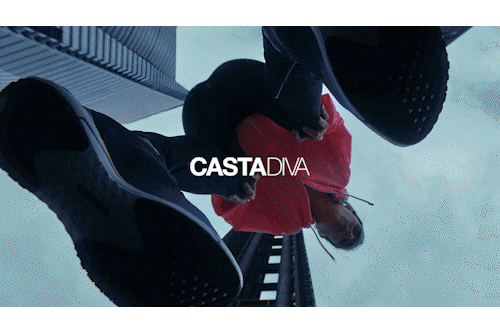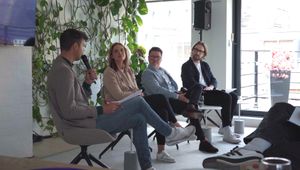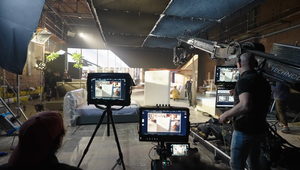
Tag’s Up and Coming Female Global Talent Shares Why Production is the Right Place for Them

Historically, the world of advertising hasn’t always been the friendliest to women. Over the past few years, the industry has been making serious strides to redress this imbalance at all levels and throughout the different sectors. For Tag, equality is an on-going conversation coupled with tangible company-wide commitments across its global offices.
Today - and in light of International Women’s Day - LBB speaks with some of Tag’s up and coming female talent - Karis Evans, production assistant, Amsterdam; Liberty Kavanagh, bookings, London; Jiratchaya “TK” Pumtuam, junior producer, Bangkok; and Jutarat ‘Jub’ Sritunya, Flame artist, Bangkok. We discuss how they got into the industry, what excites them about the world of production and advertising, and how Tag is helping them reach their career goals.
LBB> How did you get into the industry?
Karis> A dear friend of mine referred me. I was looking for something new and exciting, then after having an interview with Lonneke Bertens and Donna Head I got the job! It felt completely right to work within media and music.
Liberty> During my A-levels I knew I wanted to get into the creative industry, but at the time I just couldn’t pinpoint where and doing what. So, I thought the best place to start would be as a runner! Once my A-levels finished, I began researching all the different post houses in London and emailing each one with my CV – until I got offered a running role in Smoke and Mirrors, and the rest was history. This was three years ago, and we have since rebranded to Tag Collective Arts.
Jiratchaya> Actually, I graduated as a Communication Arts major. I first interned at a production house but soon realised it wasn’t for me, so I decided to try to find something else that would interest me. I responded to a job advert I saw on Facebook, which gave me an interview. They gave me this big opportunity to be brave, to speak English, to find myself, and to learn a lot.
Jutarat> I’ve always been passionate about movies, TV commercials and anything and everything to do with the moving image and visual arts, particularly on the VFX side. I decided I wanted to be a part of the post-production world, so I sent my photography portfolio to some post houses and luckily got my first break.
LBB> Before joining, did you have any preconceptions about the industry culture?
Karis> Honestly, this industry is still quite fresh to me, I come from a creative background but a less technical one. So, I am still learning - it has been interesting. I find our creative teams incredibly clever. A lot of the work is about problem-solving; it can be complex. I love how everyone’s input and skillset can help us deliver to the highest standard.
Liberty> Before joining I didn’t have any previous experience in this industry, so I was not 100% sure on what to expect, or how everything was to work. One thing I can say is that I was surprised by is how friendly and willing to help everyone was and have continued to be. It makes such a difference to a working environment, especially when we all had to adapt to working alongside the Covid pandemic.
LBB> What do you enjoy most about your role? And what do you find the most challenging?
Karis> At our Amsterdam office, I’m often one of the first faces visitors get to see. I like that, as I think I’m good with people. I’m seeing myself grow on a personal level. My communication skills have become so much better, I’ve learnt that clear communication and organisation are key to being successful in post-production. These were things I used to find challenging. You just need to lose that fear of speaking and remain friendly and professional.
Jiratchaya> I really enjoy talking with our artists and finding out what we can do for each project. When we first see the brief, we realise how much we can make happen and how much we can add - that reminds me, when I was in production they always used to say, “everything can be done in post!” Now that I’m a part of that process it’s challenging me to make all the things possible that they want to see in their TVC. Dealing with CG especially is incredibly challenging to me, but I want to learn more!
Jutarat> I love working out new ways to create and develop visual effects by using the latest software and techniques such as the new machine learning tools in Flame. Trying new things and trying to develop as an artist. What is the most challenging? Always getting it done in time!
LBB> Is there anyone you look up to in the industry? Why?
Karis> Having come from a family of mostly women, I am naturally more drawn to women who I find inspiring. My friends here are mostly female, we are like a girl band! Once I know I have that sisterhood support I’m at my best, my manager, Lonneke, has been wonderful. She’s incredibly strong, chilled, and empathic. A naturally cool person. It’s still a male-dominated industry and she’s firmly stood her ground. I also find Donna, (executive producer in London) an amazingly fun person!
Liberty> I wouldn’t say there is solely one person I look up to in the industry, but my team as a collective. Together, everyone brings different advice, knowledge, and experiences to the table from each of their lives which is always useful to learn from. The production team themselves just radiate positivity and make learning new things easy, so I am grateful to be a part of it.
LBB> What kind of mentorship and support to develop do you receive at TAG?
Karis> Being completely new to the industry, I have needed to work side by side with the producers, learning on the spot but at a good pace. I have also been given the freedom to venture into other roles for example, I also work with Birdbrain. Niall Rogers, who works in music production, has been really cool, he took me under his wing on some music projects. Tag is supportive of my artistic talents like painting and drawing; we are also talking about maybe doing art workshops for the team and exhibiting my work at our beautiful office.
Jiratchaya> I enjoy working here and the opportunities are open to everyone. Even if you are new, young, and inexperienced, they will listen to you. You can throw your ideas out there. You are free to try anything you want. And if something doesn’t make sense you can discuss it with anyone and they will help, guide and support you.
Jutarat> Since joining I have had a lot of very warm support and enjoy a lot of freedom to create my work. I feel lucky to work in such an environment with a great, inclusive and supportive culture.
LBB> Where do you hope to see yourself in five years?
Karis> To be a senior producer would be the goal. I like the fact that Tag is international. The music side also excites me. I’m just grateful life is moving forward allowing me this choice of moving in the direction that I want to go.
Liberty> Over the next five years I hope to see my career progress as it has done already! I started off as a runner, went onto reception and now I am currently in bookings. Producing would be the next goal on my journey, and I would hope to accomplish that within the next five years and to continue to learn many new things and broaden my already existing knowledge.
Jiratchaya> I will work my way up to become a senior producer, and I would like to have a chance to try working in another branch of TAG.
Jutarat> I think all of my skills will improve as we are constantly learning, plus tools and techniques are constantly evolving. Every day is a new journey.
LBB> What was the most useful lesson you learned in the early days of your career?
Karis> I started during the pandemic, where at the time the team was working from home quite often. However, I enjoyed coming into the office and making it a comfortable place. Especially in the few times when we had clients in. I had cut fresh flowers from our garden, stocked up on cold drinks and tasty refreshments. I found asking a lot of questions helped! Everyone has always given me their time and patience. I still ask a lot of questions.
Liberty> One of the most useful lessons I have learnt in the early days of my career is to never be afraid to ask questions. Cliché, I know, but I do think it is super important. I think when I first started running, at the beginning it was very daunting, as in my case I was starting out in an industry I had never worked in before. I think once you stop worrying about ‘being annoying’ and start by asking questions, whether that is about you needing help or you’re just curious about what someone is working on, is when you really start to gain more confidence and learn new things.
Jiratchaya> If you have many things to do just take a step back, concentrate and prioritise. Find out which task is important to do first and then go step by step.









